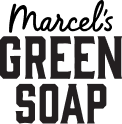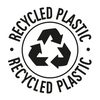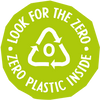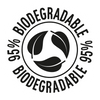Marcel's Green Soap products are not 100% natural. Huh, but you are a sustainable soap brand, right?! That's right! Natural and sustainable are often mentioned in the same breath. However, natural is not always sustainable and vice versa. We explain.
What do 'natural' and 'sustainable' actually mean?
Let's start with the good news: the supermarket shelves are becoming increasingly green. As a consumer, you have more and more choice when it comes to environmentally friendly products. But at the same time, it can sometimes cause confusion, because the green terms are flying around your ears: natural, sustainable, organic, eco-friendly, pure ... We understand that sometimes you can't see the forest for the trees. What is the best choice if you care about the planet?
Since there are no strict rules yet for when you can call something 'natural' or 'sustainable', these terms don't really say much. However, you can generally say that natural products are (largely) made from natural ingredients that are extracted directly from nature and are not or hardly processed. A sustainable product is produced and used in a way that causes as little damage as possible to people, the environment and society. The ingredients of a sustainable product can be both natural and synthetic.
“A sustainable product is produced and used in a way that causes the least possible harm to people, the environment and society.”
Natural vs. Synthetic Fabrics
The planet is a wilderness of natural ingredients that can be used to make all kinds of products, such as tea, food, clothing, health products, cosmetics, cleaning products and care products. Natural ingredients have - yes - naturally occurring properties that can be of added value to a product. For example, the ingredients can serve as a colouring or fragrance or - in the case of soap - have a softening effect on the skin. You would say: fill all products with natural ingredients! But as always 'every advantage has its disadvantage' and that also applies to natural ingredients. Not everything that Mother Nature has to offer is good for people and/or the environment. And then synthetic substances offer a good alternative.
“Not everything Mother Nature has to offer is good for people and/or the environment.”
Synthetic materials are man-made materials that are created by a chemical process in which different raw materials are combined. Some of these raw materials can have a natural origin, but in the end product they can no longer be traced back to the original material, meaning that they can no longer be called natural ingredients. The great advantage of a synthetic material is that you can completely customize it, allowing you to take allergens and biodegradability into account, for example.
“You would think that natural products are sustainable by definition. Unfortunately, that is not the case.”
Why is natural not always sustainable?
You would think that natural products are sustainable by definition. Unfortunately, that is not the case. As previously indicated, natural ingredients are extracted from nature. And what you take away does not simply grow back. Nature is not an inexhaustible source from which you can extract raw materials infinitely. In order to meet the growing demand for natural ingredients, large areas of forest and rainforest are being cut down to make room for plantations and agriculture. This is at the expense of biodiversity and the habitat of native animal species. In addition: you need a lot of most natural ingredients to have the same effect as an imitated synthetic substance.
“Nature is not an inexhaustible source from which you can extract raw materials infinitely.”
Why isn't Marcel's Green Soap 100% natural?
Every soap from Marcel's Green Soap is made from renewable ingredients, of vegetable origin. This means that the ingredients come from sustainable sources that are not depleted and have the least possible impact on the environment. We therefore consciously choose to replace natural ingredients - when necessary - with synthetic alternatives, when these have less impact on the environment. For example, our perfumes are synthetic instead of natural, because we then have more control over the quality, allergens and biodegradability. Moreover, you need a lot of natural fragrances to experience the same fragrance intensity as a small amount of synthetic perfume. A shame, right? By the way, we do like to be inspired by nature for the fragrance combinations!
“Every soap from Marcel's Green Soap is made from renewable ingredients, of vegetable origin. This means that the ingredients come from sustainable sources that are not depleted and have the least possible impact on the environment.”
What makes our products sustainable?
Despite the fact that - or perhaps precisely because - our products are not made from 100% natural ingredients, we dare to say with pride that Marcel's Green Soap products are sustainable:
At least 95% biodegradable
Because we compose the substances ourselves, we have an influence on the biodegradability of our soaps. We want to prevent harmful substances from leaving your home through the shower drain, which is why all our products are at least 95% biodegradable. This means that they (almost) completely dissolve in the wastewater without harming nature. Natural ingredients are not always biodegradable (such as essential oils), which means that they are washed into the environment as harmful substances after a shower.
“We want to prevent harmful substances from leaving your home through the shower drain, which is why all our products are at least 95% biodegradable.”
Microplastic free
Microplastics are a relatively new environmental problem. Microplastics are very small pieces of plastic that are created by the disintegration of plastic waste and the wear of car tires and clothing. Sometimes microplastics are even deliberately added to a product to improve its appearance, structure or function. These pieces of plastic eventually end up in our ecosystem. The effect of this is increasingly being scientifically demonstrated, such as here . It is a growing problem, that is for sure. And that is why all Marcel's Green Soap products are microplastic-free.
Recycled and recyclable plastic
Our products are packaged in recycled and recyclable plastic. The bottles are made of recycled plastic. This plastic is also recyclable, because the labels are easy to remove. This way, the recycled plastic can be used again and again. It is important that you throw the bottles of Marcel's Green Soap in the plastic waste!
Refillable
Marcel's Green Soap is a pioneer when it comes to refilling. More and more of our products are refillable. Why is this so sustainable? A refill package has a large content that is compactly packed, which means less freight traffic and packaging is needed. It also contributes to reducing the mountain of waste, because you don't have to throw away that beautiful bottle of Marcel's Green Soap when it's empty. By the way, a refill is also relatively cheaper than a new bottle. Win-win!
“We are always looking for ways to make our products even better, for you and the planet.”
Choose or share
Conclusion: a 100% natural and sustainable product does not exist. Choices have to be made. The road to a sustainable world is long, but every step is one. We are always looking for ways to make our products even better, for you and the planet. In recent years we have taken many steps, such as the development of our refills and the very first palm oil-free liquid detergent in the Netherlands.
Hot off the press: our deodorant roll-ons are free from aluminium salts and made from recycled plastic (the ball is made from bio-based plastic), available in three delicious fragrance combinations.









